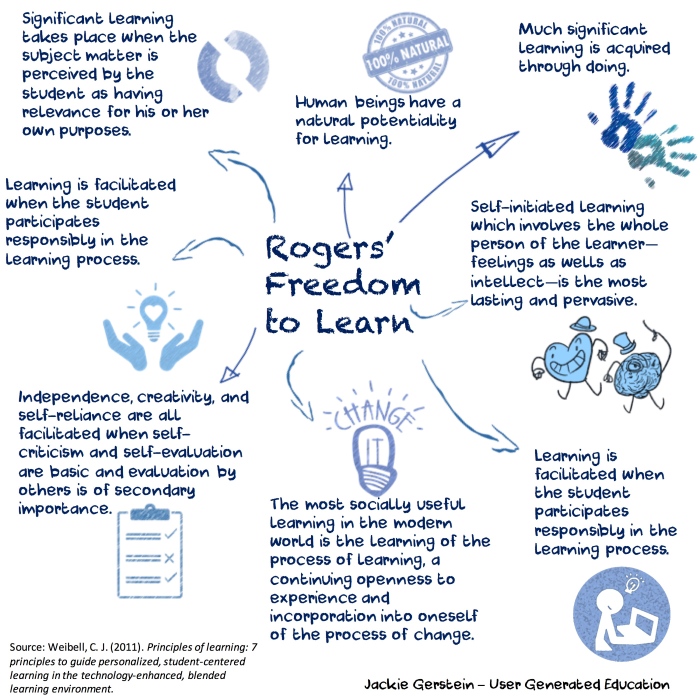Focusing on the Process: Letting Go of Product Expectations
I am a process-oriented educator. I focus on how to learn rather than what to learn. I’ve addressed this in Freedom to Learn:

In order to facilitate these desired elements of learning, I believe it is important to focus on the process of learning rather than the products of learning.
When learning is viewed as a product, and the same performance measure applies to all students, learning facilitation can be reduced to cookie-cutter teaching: same pieces of information and instruction are seen sufficient for all students. In a product-centered learning environment emphasis is often in doing activities – worksheets, charts, pre-designed projects – that are either teacher-made or provided by the publisher of the curriculum. The important part of completing these products is getting them right because these products are usually graded! Skilled and obedient students comply with these requests and try hard to get their tasks done right, yet there are many students who just leave them undone.
What about viewing learning as a process? Because students begin their daily/weekly/yearly learning from different levels of knowledge and understanding, they also will end up in different competency levels. And that is okay, honestly. We are not clones. Students shouldn’t be treated like ones. When learning is understood primarily as a process of acquisition and elaboration of information, the natural consequences in the classroom are ongoing differentiation and individualization. Approaching learning as an individual process helps us refocus learning and teaching: the student is in the nexus of her/his own learning, (Is Learning a Product or a Process?)
The following principles from Rogers’ Freedom to Learn are directly addressed when the process of learning becomes the intent of instructional practices:
Much significant learning is acquired through doing. “Placing the student in direct experiential confrontation with practical problems, social problems, ethical and philosophical problems, personal issues, and research problems, is one of the most effective modes of promoting learning” (p. 162).
Learning is facilitated when the student participates responsibly in the learning process. “When he chooses his own directions, helps to discover his own learning resources, formulates his own problems, decides his own course of action, lives with the consequences of these choices, then significant learning is maximized” (p. 162).
The most socially useful learning in the modern world is the learning of the process of learning, a continuing openness to experience and incorporation into oneself of the process of change. If our present culture survives, it will be because we have been able to develop individuals for whom change is the central fact of life and who have been able to live comfortably with this central fact. They will instead have the comfortable expectation that it will be continuously necessary to incorporate new and challenging learnings about ever-changing situations. (pp. 163-164)
Weibell, C. J. (2011). Principles of learning: 7 principles to guide personalized, student-centered learning in the technology-enhanced, blended learning environment. Retrieved from https://principlesoflearning.wordpress.com.
To truly focus on the process rather than products of learning, the educator needs to let go of expectations about the specific products that should be produced by the students. There are expectations regarding some of the processes in which learners should engage (e.g., divergent thinking, questioning, researching, creating, innovating) but the educator lets go of the pictures in her or his mind about what the products should look like.
The benefits for my learners include:
- They are not limited by my expectations nor the expectations of a lesson or assessment developed by an outside entity (e.g., textbook or testing company).
- Their engagement, motivation, curiosity, and excitement increase.
- They learn to tolerate and then embrace ambiguity.
- Natural differentiation and individualization result.
- They learn skills such as self-directed learning, taking initiative, locating resources, asking for help that can be transferred to all learning endeavors.
- It reflects and models how learning occurs outside of school.
- There is an increased investment and pride in their work.
- They develop both a sense of confidence and a sense of competence.
The benefits for me, as the educator, include:
- I work hard to pre-plan process-oriented classroom activities but the learners work harder than me during class time. Students should work harder than the educator during class time.
- I am continually surprised at and elated about what learners produce. Because of this, I get to learn from them, too. We become a learning community.
- I get to directly observe how each individual student approaches learning tasks. This furthers my ability to plan learning tasks tailored to the learners’ unique abilities and interests.
- I get to experience the joy with them as they accomplish a learning task on their own using their own personal abilities, intelligence, learning strategies, and struggles. This joy rarely occurs with standardized curriculum and assessments.
Here are some examples of process-oriented learning activities I have done with my students:
- Design Thinking Activities for Elementary Students
- Designing a Video Game
- Maker Education Activities
- Circuit Crafts https://usergeneratededucation.wordpress.com/2017/07/08/maker-education-camp-circuit-crafts/
- Cardboard Creations https://usergeneratededucation.wordpress.com/2017/06/18/cardboard-creations-a-maker-education-camp/
- Toy Hacking https://usergeneratededucation.wordpress.com/2017/04/08/toy-take-apart-and-hacking/
- Rube Goldberg Machines https://usergeneratededucation.wordpress.com/2016/11/29/simple-and-rube-goldberg-machines-a-maker-education-steam-lesson/
- Halloween Wars

Amazing and Useful article. thank you
Oliver
October 6, 2019 at 7:15 am